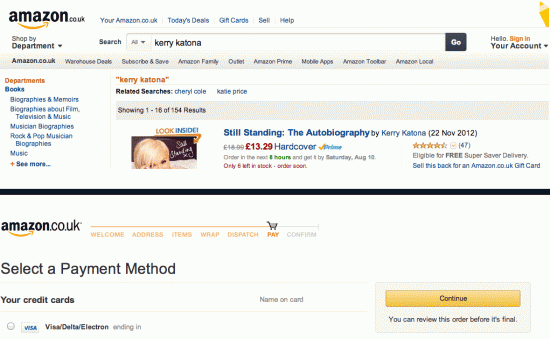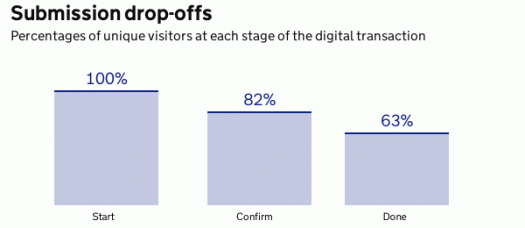For almost the first time, we are using conversion funnel data to improve government transactions. The comparisons between services are fascinating.
When you are browsing books on Amazon, the pages are full of links. Want to see a bigger picture of the cover? Click on the thumbnail. What do other people think of this book? There are pages of reviews to explore. More from this author? Just click on her name.
The second you Proceed to Checkout however: everything disappears. The picture of the book cover is removed, even the Amazon logo no longer links back to their homepage. The only thing you can click is the nice friendly button labelled ‘Continue.’

At this stage, Amazon just want to get you through the necessary steps to complete the sale. The statistics of how many people make it from one step to the next is called the conversion funnel.

For Amazon an effective conversion funnel is an important income driver: they will have worked very hard to make it easy for people to get from one end of a transaction to another.
Government however has historically been weaker in this area, or at least highly variable. Some agencies, such as Companies House, have very good statistics as to how people are going through their pages and have iterated their transactions many times; others may never have seen any data on this before.
Fixing transactions is a core part of the Government Digital Service’s mission, so learning how easy it is to complete a transaction is a crucial piece of information. Conversion funnels help pinpoint problem areas of a transaction and give service owners the data they need to improve it. It is very good that we are beginning to track this data more widely.
Gathering this data is part of the standard to which we are holding all government websites, and all new services will be collecting this information. However, many older services are starting to gather this data now so that they have some baseline data as to how their website is performing. You can see our first conversion funnels beginning to appear in the services section of www.gov.uk/performance.

As with other information on the performance pages of GOV.UK, it is only by gathering the data that we are beginning to learn what a good conversion funnel looks like.
The funnels for Amazon, along with those for Tesco, Sainsbury’s, and others remain secret so we can’t compare ourselves with them easily. However, we can begin to compare across government: if a transaction in the Ministry of Justice is performing much better than a similar one in the Department of Health, sharing that knowledge is good for both sides.
One of the things which we have learned is that government transactions can also be more complex than popping to Amazon for your copy of The Pleasures of Counting by T. W. Körner. Getting a lasting power of attorney for example - whereby you nominate someone to take decisions on your behalf should you become incapacitated - requires gathering lots of information and actual signatures along with a payment to the Public Guardian. People often go to one stage of the transaction several times over several days as they collect more information meaning that instead of a pure downward trend, we have rolling territory where some later stages get more views than earlier ones:

At this stage we still need to gather data: lasting power of attorney (the dashboard for which we will be releasing shortly) will be our most complex transaction so far and we will know more about the best way of handling this the more data we have.
I’m fascinated to see this data and look forward to more rolling in. Tell me - what is your favourite online transaction? Why was it good? Did the last transaction you did with the government live up to it?
Follow Phil on Twitter: @philbuckley5


3 comments
Comment by Irene Melo posted on
This could easily be applied to local government transactions too.
Comment by Phil Buckley posted on
I agree and there's plenty of headroom for working with local government here. It's a slightly complex situation: on the one hand, the Performance Platform (which powers gov.uk/performance) releases all its code publicly so there's nothing stopping any council building their own instance; on the other hand, if several councils put their data in the same place they would be able to compare themselves with their peers; and for me it would be good to have local government data in the same place as central.
Anyway - we're still at the alpha stage but I would be delighted to hear from anyone in local govt who is interested or who has done something similar themselves?
Comment by Irene Melo posted on
I am pushing for this funnel approach to be adopted as part of a process of channel shift.
In terms of using the same system as central government is using, I think it's more complicated due to the lack of resources.
We use our own 3rd party systems for online forms and integration with this other system (which our IT team is not familiar with and which is still in alpha) would would be a hard one to 'sell' internally.
However, once the approach is implemented, I don't see why it couldn't be made available as Open Data. That would certainly be a good step forward.
Having central gov providing more support to LA's on this front would certainly be useful.